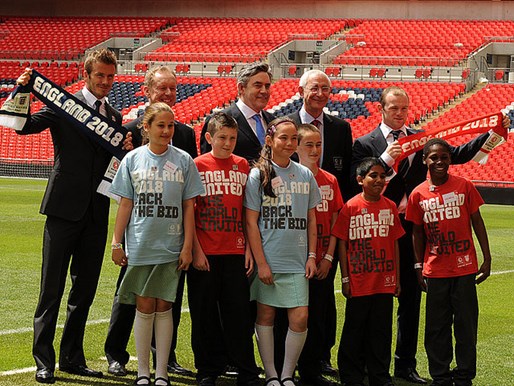Comment
Political power struggle to get the World Cup

Gordon Brown at Wembley Stadium for the launch of England's bid to host the football World Cup in 2018. Photo (c) flickr user Downing Street and licensed under a Creative Commons 2.0 licence.
02.09.2010
The fight will be settled on 2 December and although there are many unknown knowns and known unknowns – to use one of former Secretary of Defense Donald Rumsfeld’s more intelligible statements – it might be possible to predict who will get the World Cups after Brazil in 2014. The battle to get the World Cup is reminiscent of the rivalry between the superpowers during the Cold War. The only difference is that it is FIFA who decides the outcome and not the great powers themselves.
British fear of BBC documentary
FIFA has several things to consider when selecting Brazil's two successors, and recently FIFA was in been in England to assess the country’s candidacy. The English bidders think, of course, that their country is the obvious candidate for the championship in 2018, but there is much to suggest that it is not so. It also seems that the British realize that they are a little behind the other candidates: this week the English bid committee has tried to dissuade the BBC from broadcasting a documentary on Russia's World Cup campaign, because it is afraid that revelations against the Russians will be Russian roulette with England’s own candidacy.
The English bid committee is afraid that a lot of negative coverage of Russia's candidacy will be viewed as slander from the English candidate. FIFA does not like that! English bid committee’s move to stop the BBC documentary must also be seen in the light of the furore created by Lord Triesman in May this year when he accused the Russian and Spanish bidders of being corrupt. At that time, Lord Triesman held the position as head of the English bidding committee and the president of the English Football Federation. He is no longer in that position.
Tango for two
The reason that this election of the World Cup host is special is that two host nations are to be elected simultaneously. This opens up a game that makes you think of the great power rivalry of the Cold War. According to Simon Kuper of the Financial Times, the situation is as follows: the 2018 championship will most likely go to a European candidate, but since England is not very popular with FIFA – it looks a bit like the U.S. relationship with the IOC – the English bid committee has to seriously watch its steps in order to secure the championship. US in pole position
One obstacle is that the U.S. is a candidate to host the championship in 2022. FIFA will be reluctant to choose two English speaking countries as World Cup hosts in a row. Spain and Portugal, and Belgium and the Netherlands are left little chance in 2018, especially because they have little money to upgrade their facilities. The two double candidates’ only chance is that several small countries, who wish to host the Cup at a later date, join together to vote on these two European candidates. This is unlikely.
The Russian bear is threatening
As it looks now, it is the Russian bear that is England's biggest challenge, regardless of whether the BBC broadcasts its documentary or not. Russia has never hosted a major football tournament and is currently an underdeveloped market for FIFA. Therefore, Russia sought after by FIFA. And if Vladimir Putin backs a bid to host such a championship – both with his personal aura (!) and money – Russia will be in a very strong position.
China is prowling
However, it is a country who is not a candidate neither in 2018 nor 2022 that can make the big difference, namely China. From China comes the signal that the country wants to apply to host the World Cup in 2026. This may be a sure winner with FIFA and should the Chinese government make such a proposal prior to December it will change the game. FIFA will not want Asia to host the championship twice in a row, and the only non-Asian country that is a candidate in 2022 is the United States. Since FIFA will not want two English-speaking countries to host the Cup after another, and since there are indications that it is Europe’s turn to host the cup after Brazil, it will mean that Russia will win the honor of hosting the World Cup in 2018. If FIFA so wishes...
Vuvuzela, England's rescue?
During this year's World Cup, China was conspicuous by their absence - at least on the football field: the vuvuzelas, which were hated throughout the rest of the world, were produced in China. Perhaps it would be an idea for the BBC to make a documentary about China's relationship with the vuvuzela. I am sure that the English bid committee would not prevent the BBC from broadcasting this. Even FIFA got enough of the vuvuzelas.
This article first appeared on Andreas Selliaas' blog 'Sportens Uutholdelige Letthet' on August 30 2010. Follow Andreas' blog (in Norwegian) on sportensuutholdeligeletthet.blogspot.com





